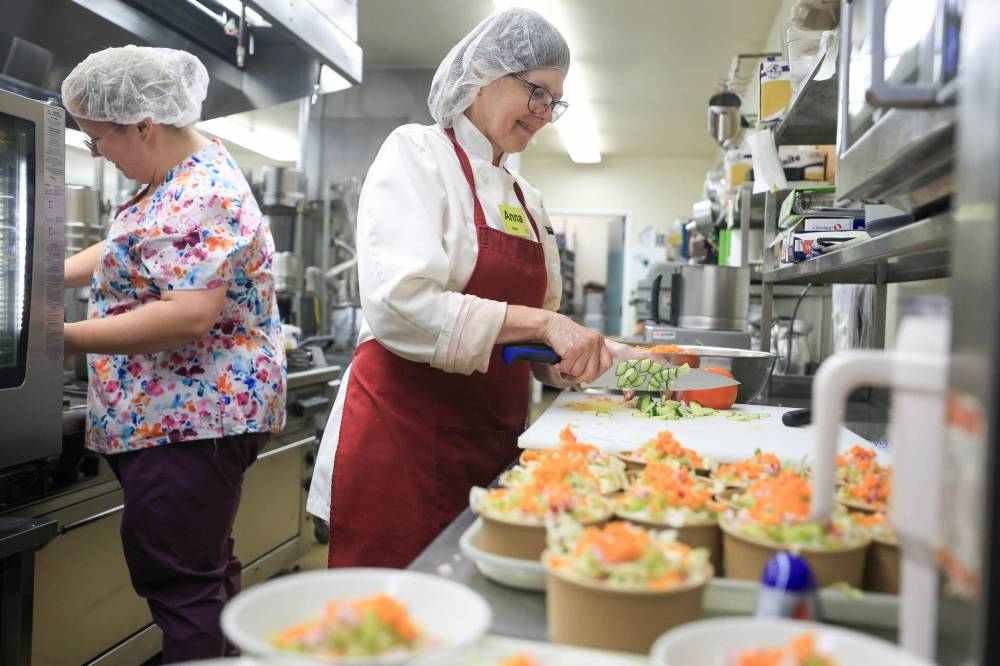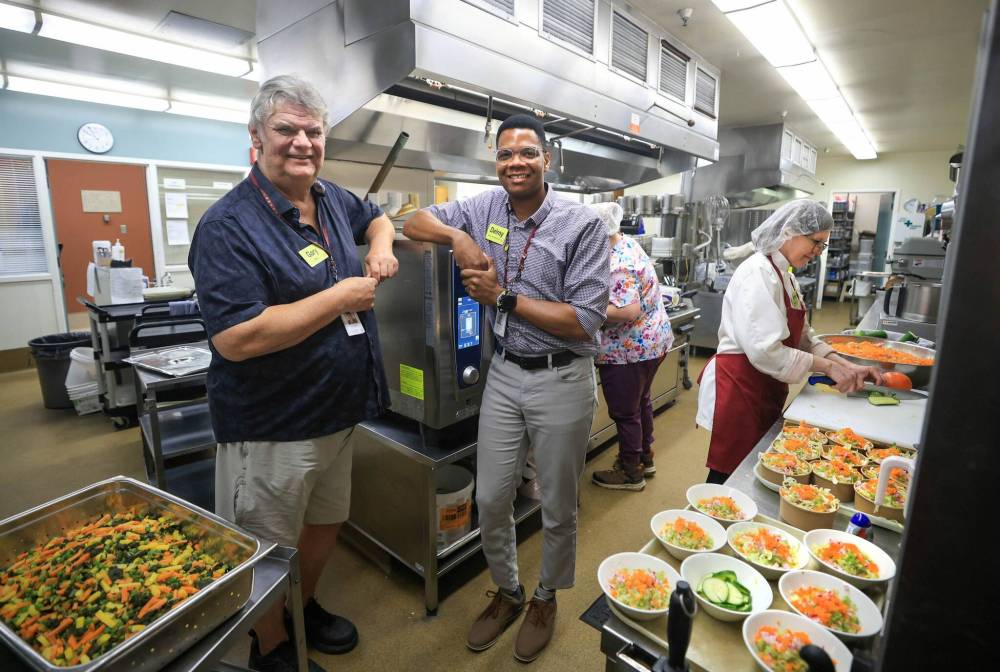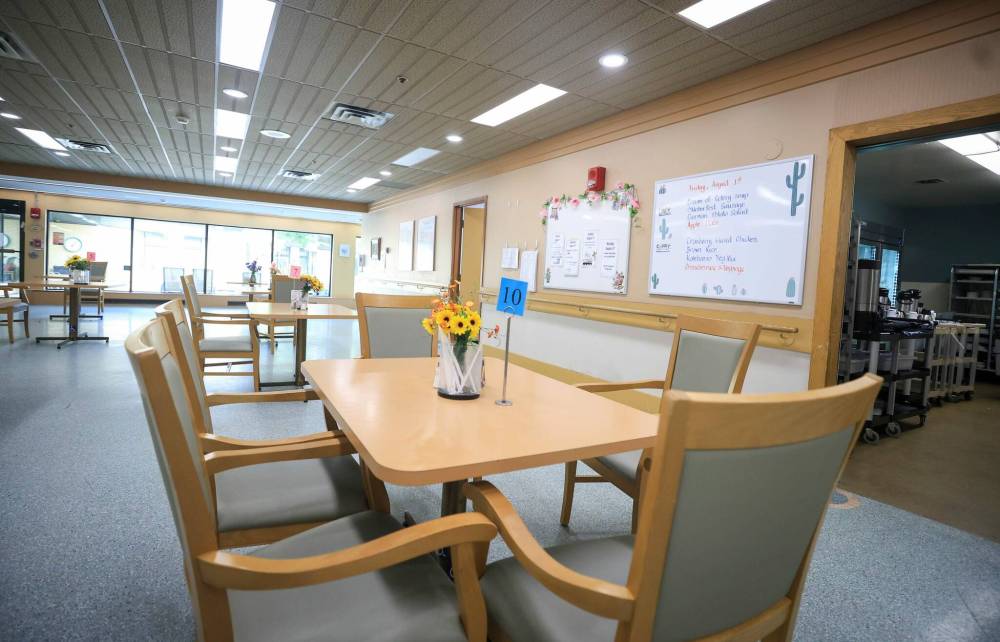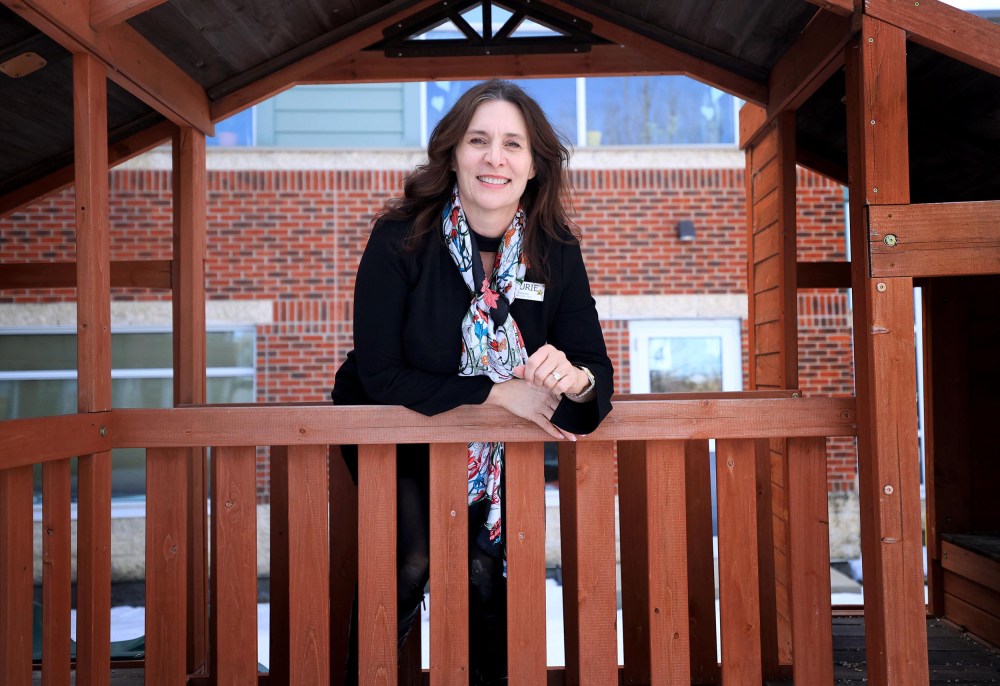Driven by faith, frustrated by funding
Care-home operators say miracles are in short supply when trying to feed residents with 2009-level resources
Advertisement
Read this article for free:
or
Already have an account? Log in here »
To continue reading, please subscribe:
Monthly Digital Subscription
$0 for the first 4 weeks*
- Enjoy unlimited reading on winnipegfreepress.com
- Read the E-Edition, our digital replica newspaper
- Access News Break, our award-winning app
- Play interactive puzzles
*No charge for 4 weeks then price increases to the regular rate of $19.00 plus GST every four weeks. Offer available to new and qualified returning subscribers only. Cancel any time.
Monthly Digital Subscription
$4.75/week*
- Enjoy unlimited reading on winnipegfreepress.com
- Read the E-Edition, our digital replica newspaper
- Access News Break, our award-winning app
- Play interactive puzzles
*Billed as $19 plus GST every four weeks. Cancel any time.
To continue reading, please subscribe:
Add Free Press access to your Brandon Sun subscription for only an additional
$1 for the first 4 weeks*
*Your next subscription payment will increase by $1.00 and you will be charged $16.99 plus GST for four weeks. After four weeks, your payment will increase to $23.99 plus GST every four weeks.
Read unlimited articles for free today:
or
Already have an account? Log in here »
For Manitoba seniors living in personal-care homes, mealtime should be highlights of the day.
Many, however, consider them sources of distress rather than nourishment or comfort.
That was the finding of a recent Free Press article that found some of Winnipeg’s 37 personal-care homes provide food that is mass-produced in an off-site commercial kitchen, frozen and then reheated and served to residents.
RUTH BONNEVILLE / FREE PRESS Bethania Personal Care Home kitchen staff members Jaime Groll (left) and Anna Sawatsky prepare lunch for care home residents.
Some of the resulting meals were described as a colourless mush that neither looked nor smelled appealing.
The solution would be for every PCH to have its own kitchen where good, healthy and appealing food can be prepared. And that’s what happens in the majority of the 24 non-profit and mostly faith-based PCHs that are part of the Manitoba Association of Residential and Community Care Homes for Everyone.
For them, it’s a matter of food and faith. But it’s a challenge because of a lack of funding needed to ensure their residents get the best food to eat.
For Gary Ledoux, CEO of the Bethania Mennonite Personal Care Home, the image that comes to mind when he thinks about providing good and healthy meals to the home’s 148 residents is the story of Jesus and the feeding of the 5,000.
In the story, Jesus is asked to feed a large crowd with only five loaves of bread and two fish. He performs a miracle, multiplying that meagre amount into enough food for everyone — with some left over.
RUTH BONNEVILLE / FREE PRESS Gary Ledoux (right), director of Bethania Personal Care Home, and Delroy Clarke, director of food and environmental services, in the kitchen where staff are preparing lunch for care home residents. 
As the son of God, Jesus could do that; Ledoux doesn’t have the same miraculous powers. But he’s doing his best with the limited resources provided by the provincial government.
Every year, the home serves 162,000 meals made from scratch in its on-site kitchen because, Ledoux said, “quality food is important for quality of life.”
This includes offering two entree choices at every meal, along with salad and fresh vegetables. The facility has a full-time dietitian who prepares an individualized meal plan for each resident that caters to their needs and preferences, including for vegetarians. And each month a tasting panel made up of residents meets to talk about the food.
“This is their home,” said Ledoux. “We want to know how the food tastes to them.”
RUTH BONNEVILLE / FREE PRESS The Bethania Personal Care Home’s dining area.
The provincial government, through the Winnipeg Regional Health Authority, has not increased the amount of funding it provides for care-home residents in Manitoba since 2009.
The annual food-services costs per resident at Bethania increased from $$2,582 in 2009 to $4,056 in 2023.
“Lack of funding is our No. 1 challenge,” Ledoux said.
To perform his own miracle and make up for the shortfall, Ledoux takes money from other budget items and relies on fundraising.
“Some of our furniture is, literally, falling apart,” he said.
“Lack of funding is our No. 1 challenge.”– Gary Ledoux, CEO of the Bethania Mennonite Personal Care Home
Bethania and other MARCHE members have talked to the government and the WRHA about the situation.
“Everyone knows there is a problem, but they aren’t doing anything,” Ledoux said. “The ball goes back and forth between the two, but nothing changes.”
Despite the lack of funding, Ledoux said Bethania’s commitment to providing the best food possible for its residents won’t change.
“Our faith teaches us that respect for elders is a biblical value,” he said, noting the Bible also instructs believers to bear each other’s burdens and that Jesus spoke about the importance of treating others the way we want to be treated.
That also means maintaining the quality of the food residents eat. “Spirituality is also about good food,” he said.
Laurie Cerqueti is the CEO of the Saul and Claribel Simkin Centre, a 200-resident PCH that operates on the basis of Jewish values.
In addition to having to deal with the rising cost of food in general, Cerqueti has to pay extra for kosher food that is prepared in the Centre’s on-site kitchen.

“It’s part of Jewish identity and values. It’s who we are,” she said.
But kosher — food that is certified and prepared according to dietary guidelines rooted in the Torah — Jewish law — is more expensive than non-kosher food, partly because there are no kosher butchers in Manitoba, so meat has to be brought in from Ontario and Quebec.
“In addition to the rising cost of meat, we have to pay the shipping,” she said.
In 2009, it cost $3,399 for food per resident per year. Today it costs $6,070.
“We have been clear with the government and the WRHA that this is very difficult for us,” she said, adding the facility had a budget deficit of $400,000 last year, partly due to the cost of serving kosher food.
“We’ve given them the numbers, but nothing changes. The WRHA says the government doesn’t give them enough money and the government says it’s up to the WRHA to determine where to spend it. Its very frustrating.”
“We’ve given them the numbers, but nothing changes. The WRHA says the government doesn’t give them enough money and the government says it’s up to the WRHA to determine where to spend it. Its very frustrating.”– Laurie Cerqueti, CEO of the Saul and Claribel Simkin Centre
In addition to the cost of food, many of the home’s elderly, largely infirm, residents have more complex dietary needs.
“We also need to figure that in to our expenses,” Cerqueti said.
As is the case at other PCHs, the facility scrimps where it can to save money and also supplements what it spends by raising funds. While that can help plug some holes, “it’s not sustainable,” she said.
It’s beginning look like the story in the book of Exodus when the people of Israel were slaves in Egypt. When Moses asked for time off for the Israelites to worship God, the Pharaoh reacted by demanding they make the same number of mud bricks to construct the cities of Pithom and Rameses — but with less straw to hold the bricks together.
When it comes to her food budget, “we can’t keep making the same number of bricks with less straw,” Cerqueti said.
The situation is similar at Luther Home, an 80-bed PCH that also owns and operates two apartment buildings for independent adults and an adult day program.
The facility, which also has its own kitchen, has seen its food costs skyrocket.
“We find creative ways to deal with it,” said CEO Keith Bytheway.
That includes taking money earned from the two apartment buildings to help cover food budget shortfalls, as well as cutting back on programs and services.
“We want to grow and serve people, but we just can’t now,” he said. “We are feeding residents on our 2009 budget.”
Bytheway realizes the WRHA is faced with a difficult challenge when it comes to deciding where health-care dollars should go. “But seniors are really absorbing the impact,” he said.
“We want to grow and serve people, but we just can’t now. We are feeding residents on our 2009 budget.”– Luther Home CEO Keith Bytheway
In addition to the rising cost of food, the needs of residents have become more complicated — and expensive.
“People are older and sicker when they come to us and need more intensive care. That increases costs,” he said.
Luther Home also offers menu choices to residents at mealtimes, along with taking into account food allergies and preferences.
“We want them to tell us what they want and need to eat,” Bytheway said.
As for why the home is willing to spend so much on food, Bytheway said it grows out of Christian faith.
“Our mission directs us to do that,” he said. “We want to offer a holistic approach to life here that includes good food. Eating is a spiritual experience. That’s why we go to the wall for our residents.”
But the situation can’t go on this way forever. If more money isn’t provided for Manitoba PCHs, “it’s going to get scary — it’s already scary,” he said.
faith@freepress.mb.ca
The Free Press is committed to covering faith in Manitoba. If you appreciate that coverage, help us do more! Your contribution of $10, $25 or more will allow us to deepen our reporting about faith in the province. Thanks! BECOME A FAITH JOURNALISM SUPPORTER

John Longhurst has been writing for Winnipeg's faith pages since 2003. He also writes for Religion News Service in the U.S., and blogs about the media, marketing and communications at Making the News.
Our newsroom depends on a growing audience of readers to power our journalism. If you are not a paid reader, please consider becoming a subscriber.
Our newsroom depends on its audience of readers to power our journalism. Thank you for your support.
The Free Press acknowledges the financial support it receives from members of the city’s faith community, which makes our coverage of religion possible.



